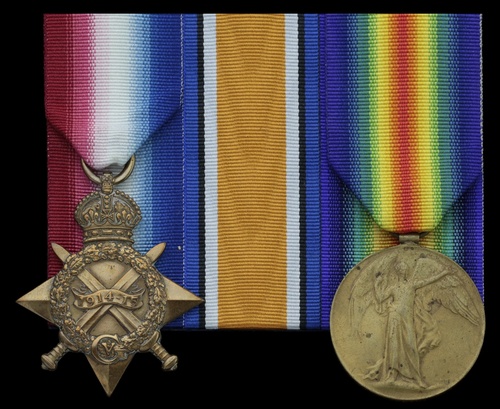
Auction: 22003 - Orders, Decorations and Medals
Lot: 256
Pair: Petty Officer F. Crumplin, Royal Navy, who served at Heligoland Bight and Dogger Bank before joining Moresby for Jutland, the last ship to make a kill during the Battle
He was later awarded the D.S.M. for his work with Destroyer Flotillas and was present for the sinking of U-110
1914-15 Star (156286. F. Crumplin. P.O. R.N.); Victory Medal 1914-19 (156286 F. Crumplin. P.O. R.N.), polished, very fine (2)
[D.S.M.] London Gazette 8 March 1918, the original recommendation states:
'For continuous good service and ability in handling his men'
Frank Crumplin was born at Paddington, London on 5 May 1875 and enlisted with the Royal Navy at H.M.S. Boscawen on 26 July 1890 as a Boy Class II. Reaching maturity aboard the protected cruiser Blake, Crumplin served aboard a number of vessels including Hearty, Edgar and Pioneer.
Promoted Petty Officer with the submarines tender H.M.S. Vulcan in July 1907, Crumplin was still serving in this rank on the outbreak of the Great War aboard the destroyer Druid. This vessel was stationed with the 1st Destroyer Flotilla during the Battles of Heligoland Bight and Dogger Bank, which cost the High Seas Fleet a number of cruisers and escorts.
Crumplin was posted to Moresby with the 13th Destroyer Flotilla on 28 April 1916 and participated in the Battle of Jutland with this vessel. Moresby along with Captain- later Admiral- John Tovey's Onslow was detached from the Flotilla to escort the Edgadine and only re-joined the fleet during the 'run to the north'. Attaching themselves to the Lion Tovey soon noticed that the German line was not screened by Light Cruisers or destroyers.
Attempting a Torpedo run the Onslow and Moresby were turned back by heavy fire. Steering to the van to the High Seas Fleet Moresby launched another attack against Markgrag, under heavy fire they launched torpedoes but unfortunately the attack was a failure. As they returned to the fleet Tiger mistook them for a German destroyer and opened up a heavy fire, only stopping when Moresby came about and presented its profile to them. Moresby's crew collected up shell fragments from the deck to taunt the Tiger's gunners.
Moresby returned to the battlecruisers and joined them in the 'run to the north'. As night fell the fleets began to fragment with Moresby, Champion and Obdurate joined two ships from the 12th Destroyer Flotilla. In the early hours of 1 June they spotted a small force of German vessels with Moresby's Lieutenant-Commander Alison deciding to attack. The darkness and the mist made the shot difficult and the torpedo missed its target however two minutes later the night was lit up by an explosion. They had struck the destroyer V4, blowing her bow off and sinking her. This was the last successful engagement of the battle and won Alison the D.S.O.
Crumplin remained with the Moresby after the battle, being awarded the Distinguished Service Medal for his work with the destroyer flotillas. He was still with this ship when- together with its sister ship H.M.S. Michael- it came across U-110, fresh from the sinking of the Amazon. The U-boat dive but both destroyers dropped depth charges, forcing it to the surface, were it was raked with gunfire and sunk.
Crumplin was finally demobilised on 31 March 1919 after many years of faithful service. He is listed as serving at H.M. Prison Wormwood Scrubs having left the navy; sold together with London Gazette extracts and service papers.
Subject to 20% VAT on Buyer’s Premium. For more information please view Terms and Conditions for Buyers.
Sold for
£80
Starting price
£50




